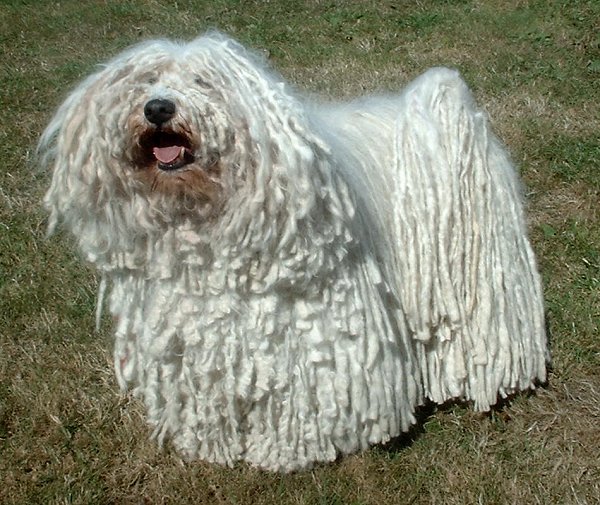- Puli
Infobox Dogbreed
akcgroup = Herding
akcstd = http://www.akc.org/breeds/puli/index.cfm
altname = Hungarian Puli
Pulik (plural)
Hungarian Water Dog
ankcgroup = Group 5 (Working)
ankcstd = http://www.ankc.aust.com/puli.html
ckcgroup = Group 7 - Herding Dogs
ckcstd = ?
country =Hungary
fcigroup = 1
fcinum = 55
fcisection = 1
fcistd = http://www.dogdomain.com/FCI/fcistandards/fci-055.htm

image_caption = White Puli
kcukgroup = Pastoral
kcukstd = http://www.thekennelclub.org.uk/item/138
name = Puli
nzkcgroup = Working
nzkcstd = http://www.nzkc.org.nz/br530.html
ukcgroup = Herding Dog Breeds
ukcstd = http://www.ukcdogs.com/breeds/herdingdogs/puli.std.shtmlThe Puli is a medium-small breed of Hungarian
dog (lat. Canis familiaris ovilis villosus hungaricus ) known for its long, corded coat. The tight curls of the coat, similar todreadlocks , make it virtually waterproof. They can be often confused with the similar but quite largerKomondor .Description
Appearance
The Puli is a solid-colored dog that can be black, white, gray, or a cream color, "fakó" in Hungary. There is also a variation of the cream coat in which the dog has a black mask. The breed standard calls for females to stand about 16 inches (42 cm) at the shoulder, and 17 inches for males. Females can weigh 23-25 pounds, males slightly more. The coat is the result of a controlled matting process and needs considerable grooming to keep its cords clean, neat, and attractive. Alternatively, the coat can be trimmed short regularly for easy maintenance, although the corded coat is what attracts many people to the breed. The coat of some sub-breeds can be different. There are variations of more felt-like coats and more rope-like corded coats.
This
breed has little to no shedding [http://www.gopetsamerica.com/dogs/dogs-that-do-not-shed.aspx Go Pets America: Dogs that do not shed - Retrieved September 7, 2008] ] (seeMoult ).Temperament
Pulik are very intelligent, have excellent agility, and are obedient enough to train for athletic competition. They are also fabulous herding dogs. They are loyal to their owners and wary of strangers. They are highly active and keep a puppy-like energy for the entirety of their life.
As a working dog, the Puli is very obedient, focused and determined when assigned a task. Some of them are used as police dogs too. As a shepherd, they are fiercely protective of their flock, and, despite their relatively small size, will blitz any intruder they consider a threat, and will try to scare and drive them away. They very rarely inflict any real injuries.
As a family dog, they make great security dogs and faithful guardians of the family. They can be very friendly and playful, even in old age. They see their family as their flock, and are wary of strangers and will keep their distance until they are sure the stranger is not a threat. When annoyed, they may attack without warning, so a considerable distance may be advisable for strangers not known by the Puli. They can be extremely independent and obstinate, and only accept strong willed individuals as master.
Training
Pulis are valued energy and determination, which is a result of their sheepdog history. Every Puli is a natural shepherd, and instinctively knows how to herd a flock of sheep or livestock, even if they have been raised as a family dog and never been trained to do it. It is advisable to start training the Puli early, especially obedience. They are very independent, strong-willed and hard to train in adulthood.
History
The Puli is an ancient
sheep dog ofHungary , introduced by the migration of theMagyars from CentralAsia in theMiddle Ages . Nomadicshepherd s of the Hungarian plains valued their herding dogs, paying as much as a year's salary for a Puli.In Asia, the breed dates back 2000 years and anecdotal evidence suggests that a Puli-like dog existed 6000 years ago. This breed is possibly the ancestor of the modern
Poodle . The ancestry of the Puli, however, is not known with certainty as there are some references to Ancient Rome.References
External links
* [http://hpk.kt1.hu/index_e.php Hungarian Puli Club]
* [http://www.puliclub.net Latin America Puli´s Club]
Wikimedia Foundation. 2010.
